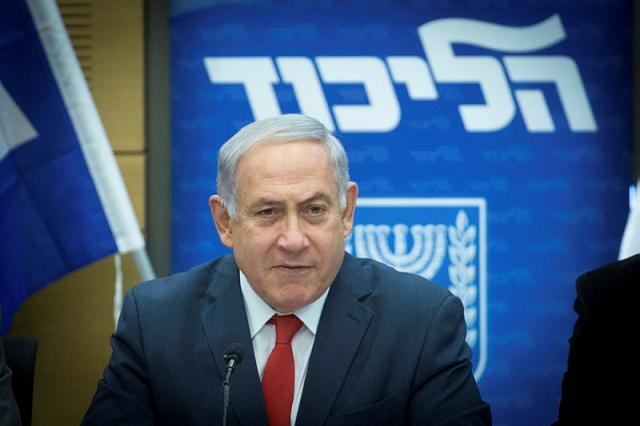The government coalition is still immersed in conflict, and early elections could still be in the offing as the prime minister, beleagured by corruption allegations, may seek public mandate to continue in office.
By Steve Leibowitz, World Israel News
Government ministers Naftali Bennett and Ayelet Shaked of the Bayit Yehudi (Jewish Home) Party, Minister Aryeh Deri of the ultra-Orthodox Shas, Knesset member Moshe Gafni of the United Torah Judaism party and Attorney General Avichai Mendleblit huddled on Thursday to come up with a plan to prevent a government collapse ahead of Prime Minister Benjamin Netanyahu’s return on Friday from the US.
The coalition members say they want to head off early elections amid the bitter coalition fight over the state budget and a bill that would grant military service exemptions to ultra-Orthodox students.
Finance Minister Moshe Kahlon, leader of the Kulanu party, is still threatening to quit his post if the 2019 budget is not passed before the start of the Knesset Passover break, due to begin at the end of next week. Defense Minister Avigdor Liberman, who heads Yisrael Beiteinu, insists that his party will not bend to the demands of his ultra-Orthodox coalition partners.
For his part, Netanyahu told reporters in Washington, “I want to come to an agreement that will enable the government to fulfill its term until November 2019, but at the present time I can’t say that this goal is achievable.”
Working long distance to avoid collapse
Netanyahu and Chief of Staff Yoav Horowitz have been working long distance to avoid a collapse of the coalition and have reportedly held several conversations with United Torah Judaism head Yaakov Litzman and other coalition partners.
Netanyahu rejected assertions that he is interested in a coalition collapse in order to justify a call for early elections before the attorney general makes a decision to indict him on any of the various investigations that are underway.
Political Scientist Avraham Diskin from the Hebrew University told World Israel News that Netanyahu’s decision could still go either way. “He says he wants elections on time and insists on stability until that time. I think he means it. If all the parties line up, the coalition will continue as usual,” Diskin said.
‘It’s a gamble’
According to Diskin, “With public opinion polls showing that Netanyahu and Likud are leading and performing strongly, he can chose early elections and return to office with a stronger mandate and with public support that he remain in office despite the indictments hanging over his head. But it’s a gamble because you don’t know that the trend of support will continue during a three-month campaign. Netanyahu knows from experience that in elections he tends to outperform polls. If re-elected despite an indictment, he thinks that could influence the legal system. We see the change. Instead of repeating his mantra that elections will take place on time, he is now saying ‘either stability or early elections.’ A change has taken place.”
Diskin says that a Netanyahu resignation, even if indicted, is becoming less likely. “I don’t think that states witnesses, including Nir Hefetz, will convince Netanyahu to leave office. A number of top legal authorities say that ‘state witnesses’ actually mean that the cases against him are weak based on the evidence. Netanyahu is not [former Prime Minister Ehud] Olmert. I do not think that he took money, and I cannot see a major corruption charge sticking to the prime minister. It can depend on the judges and the lawyers. To tell you the truth, I do not trust the legal system. At least some of them seem quite determined to try and convict Netanyahu. That could still happen because they are fed up with his antics. He is being hunted, and the polls show that his base is rallying to help him.”
‘No party stands to benefit from early elections’
Political pundit Mitchell Barak from Keevoon Strategics said, “There is no party in the coalition that stands to benefit from early elections. All are wary and trying to determine their own best interests. I would say there is an increasing likelihood that heading toward the next elections, Netanyahu and Liberman will merge Yisrael Beiteinu with Likud. Shas is very unpopular and worried about not passing the minimum threshold. If Netanyahu refuses to resign and heads Likud into the next election, he would have to run a campaign against the police and there would be unprecedented attacks on state institutions. Likud will try to gain sympathy for Netanyahu by claiming a witch-hunt.”
“If various coalition partners make good on their threats to abandon the Netanyahu government in a vote of no-confidence by the opposition, polls show that the right-wing Likud party will only benefit from early elections,” said Barak.
The latest poll from Maagar Mochot found that if elections were held today, the Likud would win 34 of the Knesset’s 120 seats compared to 30 in the current Knesset. Yair Lapid’s Yesh Atid faction would finish second with 24 seats, doubling its current strength. The opposition Zionist Union would fall from 24 to only 10, while the right-wing Jewish Home is up from 8 to 14. The ultra-Orthodox Shas party would fail to pass the electoral threshold.
According to the poll, the current coalition’s parties would garner a majority of 67 MKs and could still form the next government.


